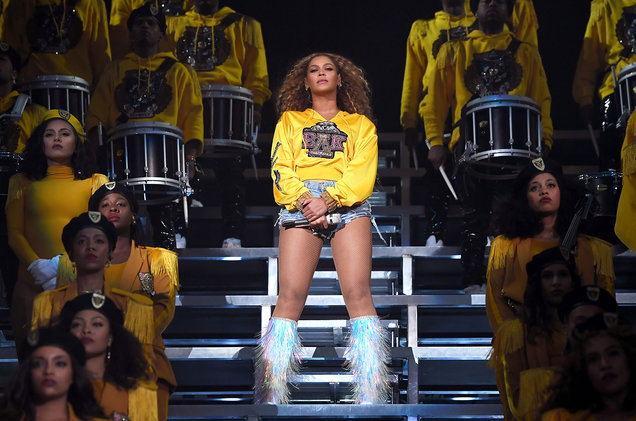In a video posted to YouTube last week, Beyoncé gushed to her 19 million subscribers about the plant-based diet she went on to prepare for her 2018 Coachella performance.

It opens with a clip of the singer’s feet.
“This is Day 1 of rehearsals for Coachella,” Beyoncé says as she steps onto a scale. “Every woman’s nightmare… this is my weight. 175 pounds. Long way to go. Let’s get it.”
READ MORE: Macy’s pulls plates after being accused of body-shaming
In the rest of the video, Beyoncé and her trainer, Marco Borges, explained her rigorous diet — “no bread, no carbs, no sugar, no dairy, no meat, no fish, no alcohol,” Beyoncé says — and exercise plan, which included hours of training per day.
Beyoncé also revealed that she did the diet for 44 days instead of 22, double the recommended length of time.
READ MORE: Skipping meals to drink more alcohol? Here’s why that’s a dangerous choice
At one point, she video-calls Borges to show him that she fits into an old costume.
“It’s a very big deal. She’s coming back. I’m coming back,” Beyoncé said.
She and Borges are now selling memberships to the 22 Days Nutrition meal planner for $18 per month or $130 per year. According to the website, members receive “access to tools and foods that empower everyone to become their healthiest self through proper nutrition.”
“Eating a more plant-based diet helped revolutionize the way they thought about food and nutrition,” said Borges.
The program was met with backlash online as fans expressed dismay that Beyoncé would promote such a restrictive diet.
Registered dietitian Abby Langer is also skeptical.
Langer is concerned that the 22 Days diet is so restrictive, it’s actually punishing. She refers to a moment in the Homecoming film — a documentary about Beyoncé’s preparation for Coachella — when Beyoncé complained about being hungry.
READ MORE: ‘The Lion King’ review — Live-action version delivers exactly what you’d expect
“Our body has hunger cues for a reason. They exist because your body wants to tell you something. In our diet culture, we’re accustomed and conditioned to ignore these cues,” Langer said.
She compares being hungry to the urge to urinate.
“If you have to pee, you wouldn’t say to yourself: ‘I’m not going to pee right now, I’m going to wait another hour.’ Our hunger cues are just as important as any other cue your body gives,” she said.
A good way to tell if a diet is too restrictive is if you’re hungry “an hour or two” after you last ate, Langer says.
“This is how you know you’re not feeding yourself adequately,” she added.
READ MORE: When ‘fat acceptance’ movement leaders decide to lose weight
Another worry Langer has about Beyoncé’s diet is its lack of variation.
“I support a plant-based diet 100 per cent but I’m not supportive of diets that are restrictive,” she said. She recommends incorporating a lot of different “whole and minimally processed foods” in your diet, but Langer also believes a bad diet is one that fosters a negative relationship with food.
“I’m not supportive of emotionally and physically punishing diets hiding under the guise of a plant-based diet,” she said.
READ MORE: Anorexia may not only be psychiatric, it could be genetic — study
According to Langer, a plant-based diet can be a very healthy alternative, but it’s important to include “high-quality” protein sources at every meal.
- What is a halal mortgage? How interest-free home financing works in Canada
- Ontario doctors offer solutions to help address shortage of family physicians
- Bird flu virus detected in U.S. grocery store milk. FDA says supply still safe
- ‘Dangerous message’: Experts slam anti-sunscreen claims circulating online
Examples of plant-based sources of protein are beans, lentils, tofu and tempeh.
READ MORE: Katy Perry does enemas to ‘cleanse her body’ — here’s why you don’t need one
Heidi Murphy, a registered dietitian for Loblaw, agreed with Langer.
“A plant-based diet can be very healthy when done properly,” she said. However, she’s worried about avoiding carbs — the main source of “fuel and energy” for the average person.
Limiting your intake of carbs can cause several unpleasant side effects.
“Headache, fatigue, low concentration levels, flu-like symptoms and more,” said Murphy.
Both Murphy and Langer said short-term diets are mostly ineffective.
READ MORE: Forever 21 accused of ‘triggering’ plus-sized customers after including diet bars in online orders
Langer agreed, saying restrictive diets are unsustainable.
“As soon as you switch back to your previous eating habits — which will eventually happen whether you like it or not — you’re going to see those results slip away,” she said.
In her experience, short-term diets aren’t worth the physical, emotional, social and financial strain they can inflict. Langer believes it’s fine to want to lose weight but that you should take a more “moderate approach.”
READ MORE: Monkey see, monkey do: Teaching your kid to love their body starts with you
“It’s not worth it to feel like crap and not live your best life,” said Langer. “You want to play the long game here. Life is short. You want to live your best life.”
A diet that prevents you from going out and having dinner with friends is one Langer would avoid.
“Stay away from the more restrictive diets and cutting out things you don’t need to cut out just because a celebrity tells you they’re toxic,” she said. “It doesn’t have to be complicated.”
Meghan.Collie@globalnews.ca




Comments